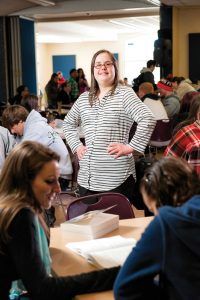Two decades ago, at a time when attitudes about educating children with disabilities were starting to change, Natalie Feriozzi was the first child with Down syndrome to attend mainstreamed kindergarten in the West Deptford school district.
Although schoolwork never came easily to her, Natalie – described by her mom Patti as a social butterfly – progressed through the grades, learning alongside other students her age.
“Academics were not the priority,” admits Patti. “Whatever she’d learn, we’d celebrate. The whole purpose was for her to be included in the community with other children.”
 So when the rest of her class moved on, mostly into higher education, it only seemed natural that Natalie should also go to college. As it turned out, she would again be a pioneer. Now 25, Natalie is a member of the first class of students with developmental and intellectual disabilities (ID) to attend Gloucester County College (GCC).
So when the rest of her class moved on, mostly into higher education, it only seemed natural that Natalie should also go to college. As it turned out, she would again be a pioneer. Now 25, Natalie is a member of the first class of students with developmental and intellectual disabilities (ID) to attend Gloucester County College (GCC).
“I love it there,” she says. “I learn a lot: math, reading, expository writing, job skills, life skills. I think it will make me more confident to go into the work world.”
Natalie is among 37 students enrolled in GCC’s Adult Center for Transition, a program that blends academics, social skills training and job sampling in a college setting. Although these students are separated from the general population for their core classes, they’re encouraged to take part in campus life, including sports teams, student activities and continuing education.
In the not-too-distant past, college would have been out of the question for Natalie and other young adults with developmental and intellectual disabilities. Low expectations, coupled with the lack of access to higher education, have also historically led to poor prospects in the job market. Only 34 percent of adults with ID are working, compared to 83 percent of nondisabled, working-age adults, according to a recent survey by Special Olympics.
Moreover, about 28 percent of working-age adults with ID have never held a job. Even those who do manage to find jobs often end up working only part-time and for lower pay than workers without disabilities, according to the study, which was conducted by Gallup and the University of Massachusetts Boston. In addition, many end up in what is known as sheltered workshops, where they perform basic tasks but are segregated from nondisabled workers.
The news isn’t all bleak. The survey found that 62 percent of people with disabilities who work in a typical work environment have held their jobs for three or more years, indicating they can perform at work, and they tend to be loyal and stick with their jobs.
But until recently, colleges and universities were unlikely settings for continuing-education programs for students with disabilities. As demand has increased and attitudes have shifted, a small but growing number of higher-education institutions have opened doors, creating programs that not only provide academics, but job and life skills. Because these programs exist on college campuses, participants are likely to immerse in college culture.
“It’s a social justice issue and the next logical step for these young people,” says Debra Hart, educational coordinator for the Institute for Community Inclusion (ICI) at UMass. “We believe they deserve to have the same options as other youth and to reap the rewards. We know that going to college, even taking one course, improves student outcomes.”
Among some 4,000 colleges and universities nationwide, GCC is one of 218 to offer inclusive education for disabled students, according to ICI. In SJ, the Garden State Pathways program at Camden County College’s Blackwood campus is the only other college serving a similar population. The College of New Jersey, in Ewing, also has options for the disabled.
All three programs receive federal funding through the Higher Education Opportunity Act of 2008, which supported the creation of new programs for students with intellectual disabilities, Hart says. The act also made students with ID eligible, for the first time, for federally funded financial assistance.
At GCC, the Adult Center for Transition (ACT) was created through the Gloucester County Special Services School District to advise and advocate for young adults with disabilities who – because they were older than 21 – no longer qualified for such services from their school districts.
“We realized, despite all the best efforts of child study teams to provide young adults with special needs air-tight transition plans, things fell through the cracks,” says Joyce Feder, ACT transition liaison and former director of special education for West Deptford schools. “Students we thought would be successful on their own in college needed more help and support than they were getting, and families often did not know where to turn.”
ACT offers its students a highly supportive environment to learn at a slower, more individualized pace, says Karen Quigley, one of two ACT teachers. Split into two groups, the students meet four mornings a week for their ACT subjects – reading, expository writing and math. On Fridays, all 37 students come together for enrichment activities, which include fitness, music, computer skills, drivers’ education and the college’s new Special Olympics sports league.
As ACT students build their skills and confidence, some have ventured to take or audit college classes outside their supported program, says Quigley. In addition, ACT students are involved with campus clubs, including the anime and animal advocacy clubs. Some have written for the school newspaper and been involved with the arts and open-mic night.
“The idea is they enter into the college environment at their own pace, so they don’t get overwhelmed,” Quigley says. “They know they can always come to us for assistance.”
In addition, students typically spend their afternoons in various jobs, giving them broad experiences in the work world. ACT is currently working with the state’s Division of Vocational Rehabilitation Services to expand internship opportunities on campus, adds Jaclyn Abrams, transition specialist and ACT teacher.
For Natalie, ACT has been an amazing experience on so many levels, says her mom Patti. Although Natalie struggled with academics throughout childhood and adolescence, she has developed more confidence and skills at GCC. She thrives socially and has enjoyed her various work experiences, Patti reports.
“She’s doing very well and is a wonderful writer, speller and reader. Every day they give them a question or subject to write about in their journal. To read what she’s writing is just amazing.”
Just as importantly, Patti says her goal that her daughter feels a part of the “real world” has been fulfilled. “No matter where we go, someone knows Natalie, whether from work or from the college” she says. “She’s just known, and she loves it.”
Whether Natalie will find a competitive, full-time job after moving on from ACT remains uncertain, Patti says, noting that she’s more concerned her daughter is happy and feels valued in whatever job she lands.
In Camden County, Garden State Pathways serves a similar role by helping students develop vocational goals and social skills on the college campus.
“It gives that student who is unsure of his footing the ability to make the jump into college or adult life,” says Bernadette Gismonde, program coordinator. “It’s really the most age-appropriate setting. They’re no longer being handheld like in high school, and they’re not running into 14-year-olds. It raises the bar for them to have to act like an 18- or 20-year-old.”
Serving 24 students, the two-year program covers academics and life skills as well as vocational placements. Many courses are geared toward practical learning, such as math classes to help students understand discounted pricing and balancing a checkbook. One popular class is based on Emily Post’s etiquette book, giving students advice on everything from how to dress for an interview or cocktail party to what to talk about at the water cooler at work, Gismonde says. Moreover, students are encouraged to venture outside the program to take classes (often accompanied by an assistant at first) and take part in college life.
Of eight students graduating in the spring, six have paid jobs in the community and one has an internship.
“Hopefully the jobs will continue after they graduate,” says Gismonde. “We mentored them to the point they’re independent.”
Pathways alum Austin Parrise, 22, currently takes courses at CCC. This semester he is enrolled in political science and English composition 1. He says that, thanks to his preparation in Pathways, he feels comfortable going to tutoring services as needed and typically goes straight to the library after class to study. One of the most valuable courses he’s taken, he says, was a class about how children with disabilities learn. It offered insight into his own challenges, he adds.
“We read about people with disabilities, how they act and how they cope with it,” says Parrise, a 2010 graduate of Cherry Hill West. “We learned that just because you have disabilities doesn’t mean you’re dumb. It just means you have some problems that other people don’t, but you can overcome them.”












